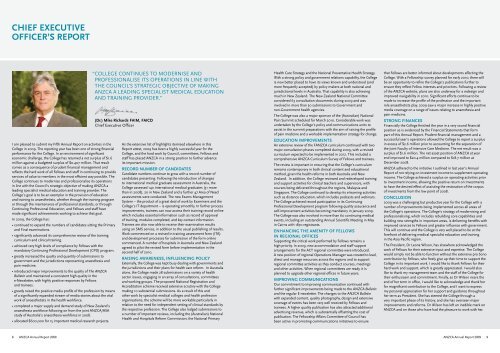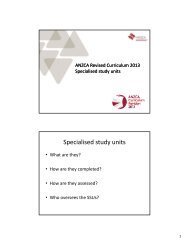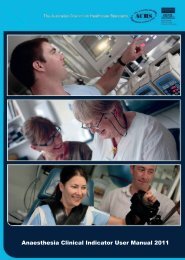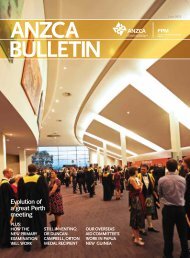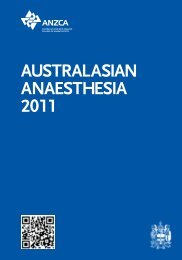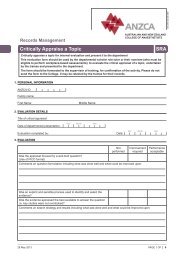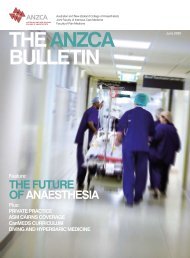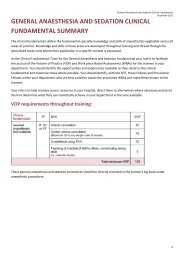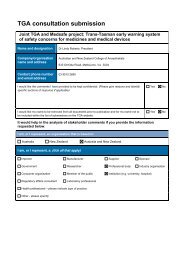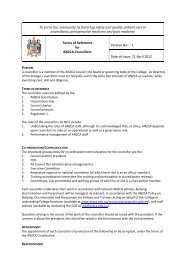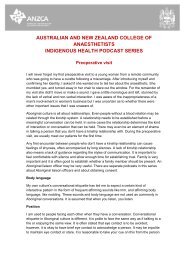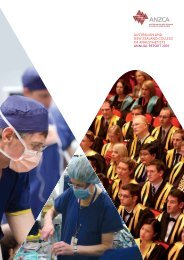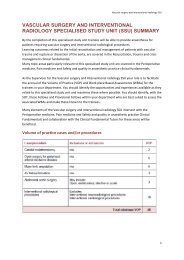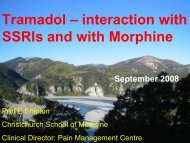Annual report 2009 - Australian and New Zealand College of ...
Annual report 2009 - Australian and New Zealand College of ...
Annual report 2009 - Australian and New Zealand College of ...
Create successful ePaper yourself
Turn your PDF publications into a flip-book with our unique Google optimized e-Paper software.
chief executive<br />
<strong>of</strong>ficer’s Report<br />
I am pleased to submit my Fifth <strong>Annual</strong> Report on activities in the<br />
<strong>College</strong> in <strong>2009</strong>. The <strong>report</strong>ing year has been one <strong>of</strong> strong financial<br />
performance for the <strong>College</strong>. In an environment <strong>of</strong> significant<br />
economic challenge, the <strong>College</strong> has returned a net surplus <strong>of</strong> $1.6<br />
million against a budgeted surplus <strong>of</strong> $0.407 million. That result<br />
comes as a consequence <strong>of</strong> prudent financial management <strong>and</strong><br />
reflects the hard work <strong>of</strong> all Fellows <strong>and</strong> staff in continuing to provide<br />
services <strong>of</strong> value to members in the most efficient way possible. The<br />
<strong>College</strong> continues to modernise <strong>and</strong> pr<strong>of</strong>essionalise its operations<br />
in line with the Council’s strategic objective <strong>of</strong> making ANZCA a<br />
leading specialist medical education <strong>and</strong> training provider. The<br />
<strong>College</strong>’s goal is to be an exemplar in the provision <strong>of</strong> education<br />
<strong>and</strong> training to anaesthetists, whether through the training program<br />
or through the maintenance <strong>of</strong> pr<strong>of</strong>essional st<strong>and</strong>ards, or through<br />
Continuing Pr<strong>of</strong>essional Education, <strong>and</strong> Fellows <strong>and</strong> staff have<br />
made significant achievements working to achieve that goal.<br />
In <strong>2009</strong>, the <strong>College</strong> has:<br />
• continued to exp<strong>and</strong> the numbers <strong>of</strong> c<strong>and</strong>idates sitting the Primary<br />
<strong>and</strong> Final examinations.<br />
• significantly advanced its comprehensive review <strong>of</strong> the training<br />
curriculum <strong>and</strong> clinical training.<br />
• achieved very high levels <strong>of</strong> compliance by Fellows with the<br />
m<strong>and</strong>atory Continuing Pr<strong>of</strong>essional Development (CPD) program.<br />
• greatly increased the quality <strong>and</strong> quantity <strong>of</strong> submissions to<br />
government <strong>and</strong> the jurisdictions representing anaesthesia <strong>and</strong><br />
pain medicine.<br />
• introduced major improvements to the quality <strong>of</strong> The ANZCA<br />
Bulletin <strong>and</strong> maintained a consistent high quality in the<br />
e-<strong>New</strong>sletter, with highly positive responses by Fellows<br />
<strong>and</strong> trainees.<br />
• greatly raised the positive media pr<strong>of</strong>ile <strong>of</strong> the pr<strong>of</strong>ession by means<br />
<strong>of</strong> a significantly exp<strong>and</strong>ed stream <strong>of</strong> media stories about the vital<br />
work <strong>of</strong> anaesthetists in the health workforce.<br />
• completed a major supply <strong>and</strong> dem<strong>and</strong> study <strong>of</strong> <strong>New</strong> Zeal<strong>and</strong>’s<br />
anaesthesia workforce following on from the joint ANZCA/ASA<br />
study <strong>of</strong> Australia’s anaesthesia workforce in 2008.<br />
• allocated $600,000 for 15 important medical research projects.<br />
“<strong>College</strong> continues to modernise <strong>and</strong><br />
pr<strong>of</strong>essionalise its operations in line with<br />
the Council’s strategic objective <strong>of</strong> making<br />
ANZCA a leading specialist medical education<br />
<strong>and</strong> training provider.”<br />
(Dr.) Mike Richards FAIM, FAICD<br />
Chief Executive Officer<br />
As the extensive list <strong>of</strong> highlights itemised elsewhere in this<br />
Report attest, <strong>2009</strong> has been a highly successful year for the<br />
<strong>College</strong>, <strong>and</strong> the hard work by Council, committees, Fellows <strong>and</strong><br />
staff has placed ANZCA in a strong position to further advance<br />
its important mission.<br />
Record number <strong>of</strong> c<strong>and</strong>idates<br />
C<strong>and</strong>idate numbers continue to grow with a record number <strong>of</strong><br />
c<strong>and</strong>idates presenting. Following the introduction <strong>of</strong> changes<br />
to international medical graduate assessment in Australia, the<br />
<strong>College</strong> assessed 140 international medical graduates (51 more<br />
than in 2008), 20 in <strong>New</strong> Zeal<strong>and</strong> <strong>and</strong> a further 47 Area <strong>of</strong> Need<br />
assessments were conducted. The new Exams Management<br />
System – the product <strong>of</strong> a great deal <strong>of</strong> work by Examiners <strong>and</strong> the<br />
<strong>College</strong>’s IT department – is operating smoothly. In further process<br />
improvements, trainees can now access their training record online<br />
which includes essential information such as record <strong>of</strong> approval<br />
<strong>of</strong> training, modules completed, <strong>and</strong> key contact information.<br />
Trainees are also now able to receive their examination results<br />
using an SMS service, in addition to the usual publishing <strong>of</strong> results.<br />
Work commenced on a revised in-training assessment form (ITA)<br />
<strong>and</strong> development processes for submission <strong>of</strong> the form online<br />
commenced. A number <strong>of</strong> hospitals in Australia <strong>and</strong> <strong>New</strong> Zeal<strong>and</strong><br />
agreed to pilot the revised form before implementation in the<br />
second half <strong>of</strong> 2010.<br />
Raising awareness, influencing policy<br />
Externally, the <strong>College</strong> was kept busy dealing with governments <strong>and</strong><br />
the jurisdictions <strong>and</strong> their plans for health care reform. In Australia<br />
alone, the <strong>College</strong> made 28 submissions on a variety <strong>of</strong> health<br />
sector issues, engaging in an array <strong>of</strong> consultations, committees<br />
<strong>and</strong> working groups. The proposed National Registration <strong>and</strong><br />
Accreditation scheme received extensive scrutiny with the <strong>College</strong><br />
making 10 substantial submissions. As a result <strong>of</strong> this <strong>and</strong><br />
other work by specialist medical colleges <strong>and</strong> health pr<strong>of</strong>ession<br />
organisations, the scheme will be more workable particularly in<br />
relation to the need for independent setting <strong>of</strong> clinical st<strong>and</strong>ards by<br />
the respective pr<strong>of</strong>ession. The <strong>College</strong> also lodged submissions to<br />
a number <strong>of</strong> important reviews, including the (<strong>Australian</strong>) National<br />
Health <strong>and</strong> Hospitals Reform Commission, the National Primary<br />
Health Care Strategy <strong>and</strong> the National Preventative Health Strategy.<br />
With a strong policy <strong>and</strong> government relations capability, the <strong>College</strong><br />
is now better placed to have its views known <strong>and</strong> understood (<strong>and</strong><br />
more frequently accepted) by policy makers at both national <strong>and</strong><br />
jurisdictional levels in Australia. That capability is also achieving<br />
much in <strong>New</strong> Zeal<strong>and</strong>. The <strong>New</strong> Zeal<strong>and</strong> National Committee<br />
considered 63 consultation documents during <strong>2009</strong> <strong>and</strong> was<br />
involved in more than 30 submissions to Government <strong>and</strong><br />
non-Government health agencies.<br />
The <strong>College</strong> was also a major sponsor <strong>of</strong> the (<strong>Australian</strong>) National<br />
Pain Summit scheduled for March 2010. Considerable work was<br />
undertaken by the <strong>College</strong>’s policy <strong>and</strong> communications units to<br />
assist in the summit preparations with the aim <strong>of</strong> raising the pr<strong>of</strong>ile<br />
<strong>of</strong> pain medicine <strong>and</strong> a workable implementation strategy for change.<br />
Education improvements<br />
An extensive review <strong>of</strong> the FANZCA curriculum continued with two<br />
major consultation phases completed during <strong>2009</strong>, with a revised<br />
curriculum expected to be implemented in 2012. This included a<br />
comprehensive ANZCA Curriculum Survey <strong>of</strong> Fellows <strong>and</strong> trainees.<br />
The review is important in ensuring that the <strong>College</strong>’s curriculum<br />
remains contemporary in both clinical content <strong>and</strong> educational<br />
method, given the health reforms in both Australia <strong>and</strong> <strong>New</strong><br />
Zeal<strong>and</strong>. In addition, the <strong>College</strong> reviewed <strong>and</strong> redeveloped training<br />
<strong>and</strong> support activities for clinical teachers <strong>and</strong> supervisors, with<br />
courses being delivered throughout the regions, Malaysia <strong>and</strong><br />
Singapore. The <strong>College</strong> continued to develop its e-learning activities<br />
such as distance education, which includes podcasts <strong>and</strong> webinars.<br />
The <strong>College</strong> achieved record participation in its Continuing<br />
Pr<strong>of</strong>essional Development program following quality assurance <strong>and</strong><br />
self-improvement activities becoming m<strong>and</strong>atory in January <strong>2009</strong>.<br />
The <strong>College</strong> was also involved in more than 60 continuing medical<br />
events, including an outst<strong>and</strong>ing <strong>Annual</strong> Scientific Meeting in May<br />
in Cairns with 1870 registrants.<br />
Enhancing the amenity <strong>of</strong> Fellows<br />
in regional <strong>of</strong>fices<br />
Supporting the critical work performed by Fellows remains a<br />
high priority. In <strong>2009</strong>, new accommodation <strong>and</strong> staff support<br />
arrangements for the ACT regional committee were introduced.<br />
A new position <strong>of</strong> regional Operations Manager was created to lead,<br />
direct <strong>and</strong> manage resources across the regions <strong>and</strong> to support<br />
regional committee activities as they conduct courses, meetings<br />
<strong>and</strong> other activities. When regional committees are ready, it is<br />
planned to upgrade other regional <strong>of</strong>fices in future years.<br />
Improving communications<br />
Our commitment to improving communication continued with<br />
further significant improvements being made to the ANZCA Bulletin<br />
<strong>and</strong> the regular E-newsletter. The changes to the ANZCA Bulletin<br />
with exp<strong>and</strong>ed content, quality photography, design <strong>and</strong> extensive<br />
coverage <strong>of</strong> events has been very well received by Fellows <strong>and</strong><br />
trainees. A higher quality publication has also attracted additional<br />
advertising revenue, which is substantially <strong>of</strong>fsetting the cost <strong>of</strong><br />
publication. The Fellowship Affairs Committee <strong>of</strong> Council has<br />
been active in promoting communications initiatives to ensure<br />
that Fellows are better informed about developments affecting the<br />
<strong>College</strong>. With a Fellowship survey planned for early 2010, there will<br />
be an opportunity to refine the <strong>College</strong>’s publications further to<br />
ensure they reflect Fellow interests <strong>and</strong> priorities. Following a review<br />
<strong>of</strong> the ANZCA website, plans are also underway for a redesign <strong>and</strong><br />
improved navigability in 2010. Significant efforts continue to be<br />
made to increase the pr<strong>of</strong>ile <strong>of</strong> the pr<strong>of</strong>ession <strong>and</strong> the important<br />
role anaesthetists play. <strong>2009</strong> saw a major increase in highly positive<br />
media coverage on a range <strong>of</strong> issues relating to anaesthesia <strong>and</strong><br />
pain medicine.<br />
Strong finances<br />
Financially the <strong>College</strong> finished the year in a very sound financial<br />
position as is evidenced by the Financial Statements that form<br />
part <strong>of</strong> this <strong>Annual</strong> Report. Prudent financial management <strong>and</strong> a<br />
successful year’s operations allowed the <strong>College</strong> to <strong>report</strong> a surplus<br />
in excess <strong>of</strong> $2.6 million prior to accounting for the separation <strong>of</strong><br />
the Joint Faculty <strong>of</strong> Intensive Care Medicine. The net result was a<br />
surplus <strong>of</strong> $1.6 million. The net asset position <strong>of</strong> ANZCA at year<br />
end improved to $20.4 million compared to $18.7 million at<br />
December 2008.<br />
ANZCA adhered to the initiative I outlined in last year’s <strong>Annual</strong><br />
Report <strong>of</strong> not relying on investment income to supplement operating<br />
income. The <strong>College</strong> achieved a surplus on operating activities prior<br />
to investment income, allowing the positive return on Investments<br />
to have the desired effect <strong>of</strong> assisting the restoration <strong>of</strong> the corpus<br />
<strong>of</strong> investments from the low point <strong>of</strong> 2008.<br />
Conclusion<br />
<strong>2009</strong> was a challenging but productive year for the <strong>College</strong> with a<br />
number <strong>of</strong> improvements being implemented across all areas <strong>of</strong><br />
the <strong>College</strong>’s operations. The <strong>College</strong>’s strategy <strong>of</strong> modernising <strong>and</strong><br />
pr<strong>of</strong>essionalising, which includes rebuilding core capabilities <strong>and</strong><br />
building new strengths in important areas, is delivering benefits with<br />
improved services to Fellows <strong>and</strong> greater influence with government.<br />
This will continue <strong>and</strong> the <strong>College</strong> is very well placed to be at the<br />
forefront <strong>of</strong> delivering medical specialist education <strong>and</strong> training<br />
in the Asia Pacific region.<br />
The President, Dr Leona Wilson, has elsewhere acknowledged the<br />
work <strong>of</strong> Fellows for their extensive input <strong>and</strong> expertise. The <strong>College</strong><br />
would simply not be able to function without the extensive pro bono<br />
contribution by Fellows, who freely give up their time to support the<br />
<strong>College</strong> in its important work. I would like to thank Fellows for their<br />
hard work <strong>and</strong> support, which is greatly appreciated. I would also<br />
like to thank my management team <strong>and</strong> the staff <strong>of</strong> the <strong>College</strong> for<br />
their enthusiasm <strong>and</strong> commitment. Finally, as Dr Wilson nears the<br />
end <strong>of</strong> her term in <strong>of</strong>fice, I would like to acknowledge <strong>and</strong> thank her<br />
for magnificent contribution to the <strong>College</strong>, <strong>and</strong> I want to express<br />
my personal appreciation for her support <strong>and</strong> guidance throughout<br />
her term as President. She has steered the <strong>College</strong> through a<br />
very important phase <strong>of</strong> its history, <strong>and</strong> she has overseen major<br />
improvements <strong>and</strong> reforms. Dr Wilson has left an inedible mark on<br />
ANZCA <strong>and</strong> on those who have had the pleasure to work with her.<br />
8 ANZCA <strong>Annual</strong> Report <strong>2009</strong><br />
ANZCA <strong>Annual</strong> Report <strong>2009</strong> 9


